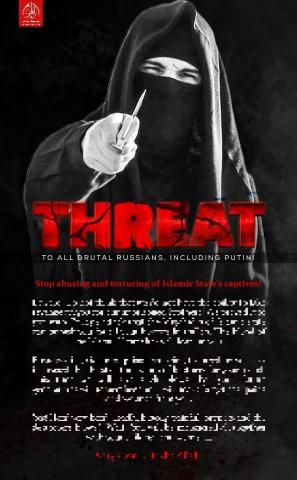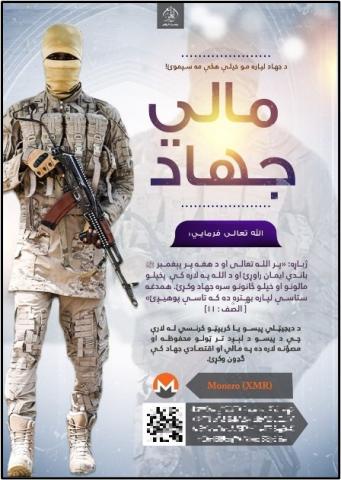(New York, N.Y.) — The Counter Extremism Project (CEP) reports weekly on the methods used by extremists and terrorist groups on the Internet to spread propaganda and incite violence. Last week, CEP researchers located propaganda issued by the pro-ISIS-K Al-Azaim Media Group as well as posts on pro-ISIS Telegram channels celebrating the March 22 terror attack in Moscow and calling for additional attacks.
CEP also located online stores selling merchandise on two different platforms glorifying the Christchurch terrorist and promoting white supremacism and neo-Nazism. Also last week, CEP researchers discovered and reported an antisemitic and white supremacist web magazine on the Internet Archive connected to a white supremacist imageboard, featuring articles promoting antisemitism alongside advertisements for extreme right content creators and products, and requesting donations in cryptocurrency.
Additionally, a Twitter/X account promoting an antisemitic propaganda video glorifying Nazi Germany and justifying the crimes of the Third Reich gained over 1,100 followers in three days, following the removal of at least three prior accounts. Also, on RocketChat, CEP located a user sharing a guide on purchasing the privacy cryptocurrency Monero while avoiding Know Your Customer (KYC) requirements. Multiple Monero wallets associated with pro-ISIS online groups have been identified as conduits for donations.
Finally, on Telegram, CEP researchers reported a Substack linked to a Telegram channel advocating for white supremacist violence, including posts promoting genocide and violence against Jews and other groups white supremacists consider “enemies.”
ISIS Claims Moscow Area Concert Hall Attack, Pro-ISIS Supporters Celebrate
ISIS took credit for the attack on a Moscow area concert hall on Friday, March 22, several hours after the attack took place, via the group’s Amaq Agency. At least 137 people were killed, and over 100 people were wounded. On March 23, ISIS released a longer document stating that the group had “dealt a strong blow to Russia” and had killed or injured 300 people. An Amaq video also released on March 23, which was approximately 90 seconds in length, contained video footage from one of the attackers that showed the assailants shooting people and cutting the throat of a man who was incapacitated.
Several pro-ISIS media groups also released videos and infographics celebrating the attack. A poster from the pro-ISIS-K Al-Azaim Media group, posted on March 25, called on Russia to stop the torture and mistreatment of alleged ISIS prisoners, stating that it would lead to further attacks. One poster located on Telegram from an online pro-ISIS group celebrated the attack as revenge against Russia, while another encouraged ISIS supporters to commit additional acts of violence. A video released from a pro-ISIS online media group contained news footage of the attack and video taken by attack survivors.

Pro-ISIS-K Al-Azaim Media poster released online on March 25 demanding that Russia stop the torture and mistreatment of alleged ISIS prisoners. Screenshot taken on March 25.
Pro-ISIS online supporters also celebrated the March 22 attack. One post on a pro-ISIS Telegram channel noted with approval that the attack occurred during a period of increased hostility between Russia, NATO, and other Western states and expressed the hope that the aftermath of the attack would lead to further global crisis. Another post stated that the attack was an act of revenge for Russia’s anti-ISIS campaign in Syria.
CEP Locates Two Online Stores Selling Merchandise Glorifying Christchurch Attacker
On March 19, CEP reported two online stores selling t-shirts that glorified the Christchurch terrorist who murdered 51 people at two mosques on March 15, 2019. The first online store, which was on the Spring e-commerce platform, also sold a variety of clothing promoting neo-Nazism and violence. Spring quickly removed the store after CEP reported it.
The second store, using the Shopify e-commerce platform according to who-hosts-this.com, sells a t-shirt honoring the Christchurch terrorist, as well as other clothing promoting white supremacism and neo-Nazism. The online store, which appears to be located in Europe, claimed that consumers were personally assisting the growth of extreme right organizations on the continent by purchasing items. The store was still active as of March 25.
Shopify prohibits the sale of items “that depict or endorse illegal activities.”
“E-commerce platforms, just like social media companies, have a responsibility to enforce their terms of service and remove content that is used to glorify acts of violence and terrorism,” said CEP Researcher Joshua Fisher-Birch. “Individuals should be preventing from making money spreading online and offline extremist content.”
Web Magazine Connected to Imageboard Promotes Antisemitism and White Supremacism
CEP researchers located a web magazine on the Internet Archive, uploaded on March 8, that promotes antisemitism and white supremacy. The web magazine is connected to a white supremacist imageboard, which has an address on the surface web and dark web. Some articles were written specifically for the publication, while others appear to have originally been imageboard posts. The magazine, which is the sixth issue, was originally released in January.
The main article stated that it was the precise right moment to promote antisemitic attitudes. Alluding to the October 7 attacks and subsequent attacks on Gaza, the article stated that the reader should highlight purported Jewish control over politics and elections in the U.S., noting that the political environment provided for an opportunity to “criticize Jews and Judaism.”
While the magazine carried a disclaimer that it does not endorse violence or criminal activity, an article using the accelerationist slogan “There is no political solution” urged the reader to embrace “a more revolutionary mindset.” Multiple users of the imageboard associated with the web magazine have encouraged acts of violence. On March 21, a user on the imageboard’s/pol board encouraged killing non-whites and promoting a culture that celebrates lone actor violence.
Other articles and comics in the web magazine promoted fascism, racism, anti-Muslim views, and anti-immigrant sentiment. The magazine also included advertisements for extreme right content creators and products made by online extreme right stores. The magazine requested donations in Bitcoin, Ethereum, or Monero.
CEP reported the magazine to the Internet Archive on March 21, who made the magazine only available to logged in members of the website.
Twitter/X Account Promoting Antisemitic Propaganda Video Returns to Twitter After Previous Deletion
On March 18, a Twitter/X account connected to a campaign promoting an antisemitic propaganda video began tweeting after at least three prior accounts were removed. The current active account was created in March 2024. The account promotes and shares a link to an antisemitic purported documentary that glorifies Nazi Germany and justifies the crimes of the Third Reich. The Twitter/X account had over 1,100 followers after being active for three days. The previous account, which was removed from Twitter/X in February, had over 6,200 followers after being active for approximately one week. The account posted antisemitic content and promoted the great replacement conspiracy theory.
On January 25, a prominent white supremacist Twitter/X account with over 7,000 followers allegedly tied to members of the Canadian neo-Nazi scene conducted a poll where 64% of 1,199 voters named the antisemitic propaganda video the best piece of content for winning people over to their cause.
CEP reported the account to Twitter/X on March 21. It was still on the platform on March 25.
The approximately 12-hour documentary is also available to watch directly on Twitter/X. CEP previously reported the same Twitter/X account that posted the video in June, but it was still online as of March 21. The first installment of the video has over 830,000 views.

An antisemitic post promoting the great replacement conspiracy theory on Twitter/X, posted by the fourth iteration of a Twitter/X account that promotes an antisemitic propaganda video. Screenshot taken on March 21.
Pro-ISIS Chat Users Discuss Monero Exchanges, Avoiding KYC Requirements
In a pro-ISIS chatroom on the RocketChat platform on March 13, an online supporter of the terrorist organization discussed acquiring the privacy cryptocurrency Monero. Specifically, following a post that included a Monero wallet for donations that appeared in Voice of Khorasan magazine, a user posted a link for a guide to purchase Monero while evading Know Your Customer (KYC) requirements. The guide, which suggested five different exchanges for purchasing Monero, was published in October 2023 by an individual unaffiliated with ISIS who writes about cryptocurrency.
Monero has several privacy features, including ring signatures and encryption, to ensure that transactions are private. In addition to transaction paths, wallets are also private. Online pro-ISIS groups operate at least four Monero wallets where donations can be sent. On several occasions, users on RocketChat have offered tips on acquiring and using Monero.

Call for Monero donations via the pro-ISIS-K Al-Azaim Media group.
Terrorgram Adjacent Substack Reported
On March 11, CEP researchers reported a Substack connected to a Telegram channel that promotes acts of white supremacist violence. The Telegram channel administrator stated that he was starting the Substack in case Telegram removed his content. The “about” section of the Substack explicitly advocates genocide. Posts on the Substack encourage violence against Jews and other “enemies.” Despite reporting the account, the Substack was active as of March 25.